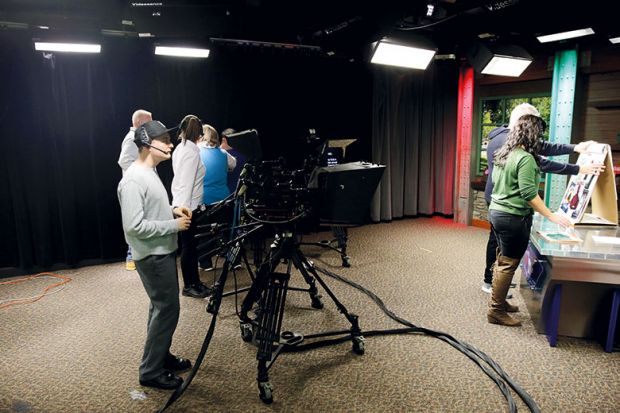I’m a PhD student and researcher so usually I’d be standing behind a laboratory bench, wearing a lab coat, growing bacteria and carrying out biochemical reactions. Instead, I’m in Nairobi where I’ve been for the past three months developing an online training resource to teach bioinformatics.
This work has been part of the Professional Internships for PhD Students (PIPS) scheme for Biotechnology and Biological Sciences Research Council-funded projects. The goal of these internships is to help students broaden their skill sets and experience outside the laboratory to better meet what potential future employers are looking for.
The experience took me out of my routine and work at the John Innes Centre in Norwich, UK to doing something completely different in science media production and science communication in Africa.
For the project, my fellow PhD student Hans Pfalzgraf and I were tasked with developing the training video series for the International Livestock Research Institute in Nairobi.
The project naturally started right at the beginning, with planning and branding. This led to the development of a pilot episode that established a “production pipeline”, which could then be emulated going forward.
The pilot episode involved all the traditional steps associated with media production including script writing, casting, filming and directing as well as the post-production elements needed to create a professional final product including graphic and sound design, chroma key, and 2D and 3D animation.
The final pilot episodes had local Kenyan presenters but initially, to demonstrate the style that I wanted from the videos, I got to try my hand at presenting in the early test footage. Seeing and editing myself on screen was somewhat bizarre but I did enjoy the presenting experience.
All the technical aspects of what I did over the past three months were written up as a user guide. This, along with all the assets that we produced, were handed over to the research institute so that the series can be continued once we leave.
This project was a capacity-building effort designed to broaden the reach of the research institute to students and scientists from low- and middle-income countries. Students interested in learning useful scientific material, but who cannot relocate to Nairobi, will be able to benefit from the free content.
We have just one week to go before the internship is over, but during the past three months I have been able to grow and develop so much more than I could have predicted. Being in a new environment and culture was an excellent space to build and apply a wide variety of skills.
In terms of technical skills, I have learned about professional camera and studio operation, video editing, graphic animation, sound editing, videography and bioinformatics. With transferable skills, I have been able to build upon project management, communication, leadership, creativity and problem-solving skills.
I’d say the most valuable skill of all for me, however, was improving my science communication. I learned how to best break down complex topics and convey them to a non-expert audience. This has a wealth of applications, not only in academia, and will give me the confidence to present challenging topics to a variety of audiences in future.
I had never done anything like this before, so it was a really excellent opportunity because I am interested in science communication. It is a potential career avenue for me and so getting the chance to build these skills was incredibly useful.
If I ultimately decide that science communication isn’t the right career destination for me, I’m sure that the transferable skills I’ve gained in the past three months will be applicable in a wide variety of fields and industries, both within and outside science.
Internship schemes such as PIPS are fantastic at preparing PhD students for life after their degree. This helps to make a PhD so much more than just training in a specific field; it now becomes a more comprehensive programme that will ultimately better prepare individuals for a successful career, no matter what direction they opt for.
Danny Ward is a postgraduate researcher at the John Innes Centre.
POSTSCRIPT:
Print headline: My internship is training me for life after the PhD
Register to continue
Why register?
- Registration is free and only takes a moment
- Once registered, you can read 3 articles a month
- Sign up for our newsletter
Subscribe
Or subscribe for unlimited access to:
- Unlimited access to news, views, insights & reviews
- Digital editions
- Digital access to THE’s university and college rankings analysis
Already registered or a current subscriber?




